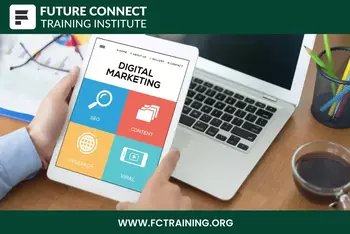Gateway Qualifications Level 3 Certificate in Social Media for E-Commerce
Learners will understand project management concepts and the processes and tools used by organisations to manage social media for ecommerce projects. They will learn about project management methodologies and use project management software to plan a social media for ecommerce project, track progress, and review outcomes to determine project success.
Unit Learning Outcomes
Example social media for ecommerce projects could include:
- Design/develop an ecommerce website
- Tools to build brand awareness, drive traffic website, increase sales, etc.
- Social media strategy
- Search Engine Optimisation (SEO) strategy
- The creation of an online community
Project life cycle:
- Conception and start up: project mandate, client requirements, and feasibility.
- Definition of the project: set up project team, create the Project Initiation Document (PID).
- Planning: timescales, costs, quality management, risk management and controls.
- Launch and execution: carrying out the plan, monitoring activity, checking progress.
- Closure: handover of the product, user acceptance testing, disbanding project team.
- Post-project evaluation: reviewing the project against success criteria.
- Concepts include the key factors, processes and stages that make up a project, such as:
- Costs and timescales: project budget, setting milestones and deadlines, interim reviews.
- Project management tools: Gantt charts, PERT charts, critical path methods, specialised software packages such as Microsoft Project.
Quality and deliverables:
- Application of current quality standards, for example: ISO/IEC 25010:2011 as a benchmark for software development, World Wide Web Consortium for website design and functionality standards.
- Defining success criteria and using SMART objectives to define project outcomes.
- Customer requirements in terms of functional requirements and non-functional requirements.
- Product description or product breakdown structure, to describe the product to be delivered.
Issues: effects of changing external factors, monitoring progress, taking corrective actions where necessary, communications, working within relevant guidelines (internal and external) and legislation, dealing with conflict, impact of project outputs on other systems e.g. staff, organisational structures.
Benefits: saving money, maintaining or increasing profits, improving services, growing the business, increasing market share, improving productivity, expected return on investment, justification for the project, forecasting project success.
Risks: identifying typical project risks (internal/external risks), risk management cycle, identification of risks, assessing the severity of risks, accept the risk, plan contingency or avoid the risk, monitor and control the risks through the project, handling issues when a risk occurs.
Project management methodologies:
- PRINCE2 – suitable for most projects.
- Rapid Application Development (RAD) – suitable for short-term, large scale, big budget projects.
- Waterfall – suitable for websites, database or network projects.
- Agile – suitable for medium/long term projects where user requirements frequently change and outputs are required at regular intervals.
Assessment Criteria
- 1.1 Explain the stages of the project lifecycle and how they apply to social media for ecommerce projects
- 1.2 Describe key concepts, issues and risks when managing social media for ecommerce projects.
- 1.3 Compare the characteristics of different project management methodologies used by organisations.
The project must be sufficiently complex to allow planning and management to take place. It must also allow learners the opportunity to manage some resources, and the time allocated for completion.
Interpreting the business case (the business case as a driver of the project): reasons for the project, options that should be considered, expected business benefits, timescale, including major milestones, budget available, risks.
Project specification: identification of stakeholders, business case requirements, specific objectives or deliverables, benefits and success factors, project boundaries or scope, constraints, consideration of options, other e.g. ethical issues, sustainable issues, understanding consequences of failure to hit deadlines or produce product, risks and risk mitigation.
Project plan: purpose, content e.g. identification of phases and activities, potential for parallel or sequential processes, resources needed for each activity, timescales, review points e.g. milestones, checkpoints, deadlines.
Project management tools: Gantt charts, PERT charts, critical path methods, specialised software packages such as Microsoft Project, use of other appropriate and available software and applications e.g. spreadsheets, graphics, databases etc.
Assessment Criteria
- 2.1 Produce a project specification for a social media for ecommerce project.
- 2.2 Use project management software to plan a social media for ecommerce project.
Monitor: routine communications with stakeholders, interim reviews, use of logbooks, routine updating of plan where necessary, others, e.g. accessing additional resources where necessary, reacting to unforeseen circumstances.
Tracking progress: project baseline and variance, monitoring and recording progress, checkpoint reports as a way of recording milestones achieved, monitoring risk and managing issues, recording quality management activity.
Review of project success in terms of key factors, SMART objectives and views of stakeholders: review of lessons learned, review project performance against the baseline and project objectives, review of final cost, delivery date and quality of product delivered, review feedback from key stakeholders (clients, end users).
Methods to obtain feedback: interviews, questionnaires, surveys, observation of resulting processes.
Recommendations for future actions based on the outcome of the post-project review, communication and presenting requirements for reviews.
Assessment Criteria
- 3.1 Use project management software to monitor a project plan and track progress against the plan.
- 3.2 Carry out a post-project review to determine project outcomes.
FAQs
You'll explore the unique challenges of these projects, such as the rapidly evolving social media landscape, managing online reputation, dealing with customer feedback and engagement, tracking the ROI of social media efforts, and navigating the ethical and legal considerations of online marketing. You'll also learn about general project management risks like scope creep and communication breakdowns.
Yes, a key part of this unit involves using project management software, such as Microsoft Project, to effectively plan, monitor, and review social media for e-commerce projects. You'll learn how to define project specifications, create detailed plans with timelines and resource allocation, track progress, and manage any issues that arise.
You will learn how to define clear and measurable success criteria using SMART objectives relevant to e-commerce goals (e.g., increased website traffic, higher conversion rates, improved brand sentiment). You'll also understand how to gather feedback from stakeholders and conduct post-project reviews to assess the project's impact on business outcomes and identify areas for improvement in future campaigns.

This course includes:
- Creative Activities, Lectures and more
- Masters level Course Content with Hands-on Training
- Multiple Projects to test your skills upon
- Join the leading Industry with over 20 billion Pounds of investment
- Online Practical Training
- Flexible Payment Structure
- CV Support







